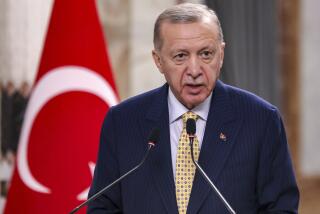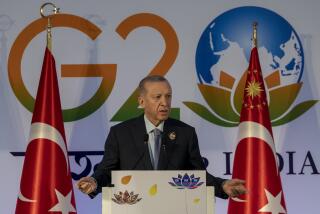Where West meets East
- Share via
BULENT ECEVIT, ONE OF the most important leaders in modern Turkish history, died Sunday in Ankara. His dream may be dying a slow death in Brussels.
“There can be no Europe without Turkey, and no Turkey without Europe,” Ecevit said in 1999. A four-term prime minister, Ecevit was by the end of his career a supporter of open markets and greater integration with the West.
On Wednesday, the European Commission released a progress report on Ankara’s bid to join the European Union. It was highly critical of the pace of Turkey’s reforms on issues such as freedom of speech and its failure to recognize Cyprus.
Cyprus is indeed the stumbling block of the day, but there is a more fundamental resistance across much of Western Europe to the idea that Turkey could join the EU. The EU is still digesting 10 new Central and Eastern European members with a lower standard of living, and there are some understandable concerns about absorbing 73 million Turks on the continent’s periphery.
But the genius of Europe’s enlargement process has been its ability to raise living standards in new member states while being flexible in phasing in full integration so as to not drag down living standards among richer members. Because of the terms of Poland’s accession to the EU, for instance, its farmers have not impoverished French farmers. What’s more, given demographic trends, Europe would increasingly benefit from Turkey’s large labor pool and its vibrant consumer market.
Opposition to Turkey’s candidacy in nations such as France is increasingly about cultural identity. This is unfortunate, as it undermines the idea of a largely secular Muslim Turkey serving as a bridge between West and East. Its successful integration with Christian Europe would demonstrate that the religions need not be at odds and that Western-style democracy is not unattainable in the Middle East.
But confronted with European rejection, many sectors of Turkish society seem intent on derailing integration, making the Turkey-isn’t-suited claim a self-fulfilling one. Turkey’s Article 301, a vague law that makes it a crime to publicly insult the nation, is a nationalist measure aimed at provoking Brussels.
And then there is Cyprus, which joined the EU in 2004 and thus has the ability to block any new members. Turkey invaded Cyprus in 1974, under Ecevit, and part of the island remains under Turkish control while Ankara refuses to recognize the Cypriot government. Talks to resolve the impasse recently collapsed.
At an EU summit in mid-December, commissioners may decide to suspend accession talks with Turkey for a year or more. That would be unfortunate -- for both sides of this courtship.
More to Read
Sign up for Essential California
The most important California stories and recommendations in your inbox every morning.
You may occasionally receive promotional content from the Los Angeles Times.













